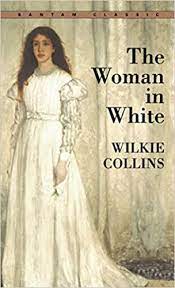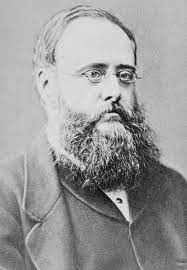The Woman in White Page #5
The Woman in White is Wilkie Collins's fifth published novel, written in 1859. It is a mystery novel and falls under the genre of "sensation novels". The story is an early example of detective fiction with protagonist Walter Hartright employing many of the sleuthing techniques of later private detectives
inspired by our national grog, which appeared to get into his head, in the most marvellous manner, five minutes after it had gone down his throat, asserted his claims to be considered a complete Englishman by making a series of speeches in rapid succession, proposing my mother's health, my sister's health, my health, and the healths, in mass, of Mr. Fairlie and the two young Misses, pathetically returning thanks himself, immediately afterwards, for the whole party. "A secret, Walter," said my little friend confidentially, as we walked home together. "I am flushed by the recollection of my own eloquence. My soul bursts itself with ambition. One of these days I go into your noble Parliament. It is the dream of my whole life to be Honourable Pesca, M.P.!" The next morning I sent my testimonials to the Professor's employer in Portland Place. Three days passed, and I concluded, with secret satisfaction, that my papers had not been found sufficiently explicit. On the fourth day, however, an answer came. It announced that Mr. Fairlie accepted my services, and requested me to start for Cumberland immediately. All the necessary instructions for my journey were carefully and clearly added in a postscript. I made my arrangements, unwillingly enough, for leaving London early the next day. Towards evening Pesca looked in, on his way to a dinner-party, to bid me good-bye. "I shall dry my tears in your absence," said the Professor gaily, "with this glorious thought. It is my auspicious hand that has given the first push to your fortune in the world. Go, my friend! When your sun shines in Cumberland (English proverb), in the name of heaven make your hay. Marry one of the two young Misses; become Honourable Hartright, M.P.; and when you are on the top of the ladder remember that Pesca, at the bottom, has done it all!" I tried to laugh with my little friend over his parting jest, but my spirits were not to be commanded. Something jarred in me almost painfully while he was speaking his light farewell words. When I was left alone again nothing remained to be done but to walk to the Hampstead cottage and bid my mother and Sarah good-bye. IV The heat had been painfully oppressive all day, and it was now a close and sultry night. My mother and sister had spoken so many last words, and had begged me to wait another five minutes so many times, that it was nearly midnight when the servant locked the garden-gate behind me. I walked forward a few paces on the shortest way back to London, then stopped and hesitated. The moon was full and broad in the dark blue starless sky, and the broken ground of the heath looked wild enough in the mysterious light to be hundreds of miles away from the great city that lay beneath it. The idea of descending any sooner than I could help into the heat and gloom of London repelled me. The prospect of going to bed in my airless chambers, and the prospect of gradual suffocation, seemed, in my present restless frame of mind and body, to be one and the same thing. I determined to stroll home in the purer air by the most roundabout way I could take; to follow the white winding paths across the lonely heath; and to approach London through its most open suburb by striking into the Finchley Road, and so getting back, in the cool of the new morning, by the western side of the Regent's Park. I wound my way down slowly over the heath, enjoying the divine stillness of the scene, and admiring the soft alternations of light and shade as they followed each other over the broken ground on every side of me. So long as I was proceeding through this first and prettiest part of my night walk my mind remained passively open to the impressions produced by the view; and I thought but little on any subject--indeed, so far as my own sensations were concerned, I can hardly say that I thought at all. But when I had left the heath and had turned into the by-road, where there was less to see, the ideas naturally engendered by the approaching change in my habits and occupations gradually drew more and more of my attention exclusively to themselves. By the time I had arrived at the end of the road I had become completely absorbed in my own fanciful visions of Limmeridge House, of Mr. Fairlie, and of the two ladies whose practice in the art of water-colour painting I was so soon to superintend. I had now arrived at that particular point of my walk where four roads met--the road to Hampstead, along which I had returned, the road to Finchley, the road to West End, and the road back to London. I had mechanically turned in this latter direction, and was strolling along the lonely high-road--idly wondering, I remember, what the Cumberland young ladies would look like--when, in one moment, every drop of blood in my body was brought to a stop by the touch of a hand laid lightly and suddenly on my shoulder from behind me. I turned on the instant, with my fingers tightening round the handle of my stick. There, in the middle of the broad bright high-road--there, as if it had that moment sprung out of the earth or dropped from the heaven--stood the figure of a solitary Woman, dressed from head to foot in white garments, her face bent in grave inquiry on mine, her hand pointing to the dark cloud over London, as I faced her. I was far too seriously startled by the suddenness with which this extraordinary apparition stood before me, in the dead of night and in that lonely place, to ask what she wanted. The strange woman spoke first. "Is that the road to London?" she said. I looked attentively at her, as she put that singular question to me. It was then nearly one o'clock. All I could discern distinctly by the moonlight was a colourless, youthful face, meagre and sharp to look at about the cheeks and chin; large, grave, wistfully attentive eyes; nervous, uncertain lips; and light hair of a pale, brownish-yellow hue. There was nothing wild, nothing immodest in her manner: it was quiet and self-controlled, a little melancholy and a little touched by suspicion; not exactly the manner of a lady, and, at the same time, not the manner of a woman in the humblest rank of life. The voice, little as I had yet heard of it, had something curiously still and mechanical in its tones, and the utterance was remarkably rapid. She held a small bag in her hand: and her dress--bonnet, shawl, and gown all of white--was, so far as I could guess, certainly not composed of very delicate or very expensive materials. Her figure was slight, and rather above the average height--her gait and actions free from the slightest approach to extravagance. This was all that I could observe of her in the dim light and under the perplexingly strange circumstances of our meeting. What sort of a woman she was, and how she came to be out alone in the high-road, an hour after midnight, I altogether failed to guess. The one thing of which I felt certain was,
Translation
Translate and read this book in other languages:
Select another language:
- - Select -
- 简体中文 (Chinese - Simplified)
- 繁體中文 (Chinese - Traditional)
- Español (Spanish)
- Esperanto (Esperanto)
- 日本語 (Japanese)
- Português (Portuguese)
- Deutsch (German)
- العربية (Arabic)
- Français (French)
- Русский (Russian)
- ಕನ್ನಡ (Kannada)
- 한국어 (Korean)
- עברית (Hebrew)
- Gaeilge (Irish)
- Українська (Ukrainian)
- اردو (Urdu)
- Magyar (Hungarian)
- मानक हिन्दी (Hindi)
- Indonesia (Indonesian)
- Italiano (Italian)
- தமிழ் (Tamil)
- Türkçe (Turkish)
- తెలుగు (Telugu)
- ภาษาไทย (Thai)
- Tiếng Việt (Vietnamese)
- Čeština (Czech)
- Polski (Polish)
- Bahasa Indonesia (Indonesian)
- Românește (Romanian)
- Nederlands (Dutch)
- Ελληνικά (Greek)
- Latinum (Latin)
- Svenska (Swedish)
- Dansk (Danish)
- Suomi (Finnish)
- فارسی (Persian)
- ייִדיש (Yiddish)
- հայերեն (Armenian)
- Norsk (Norwegian)
- English (English)
Citation
Use the citation below to add this book to your bibliography:
Style:MLAChicagoAPA
"The Woman in White Books." Literature.com. STANDS4 LLC, 2025. Web. 21 Jan. 2025. <https://www.literature.com/book/the_woman_in_white_1567>.




Discuss this The Woman in White book with the community:
Report Comment
We're doing our best to make sure our content is useful, accurate and safe.
If by any chance you spot an inappropriate comment while navigating through our website please use this form to let us know, and we'll take care of it shortly.
Attachment
You need to be logged in to favorite.
Log In